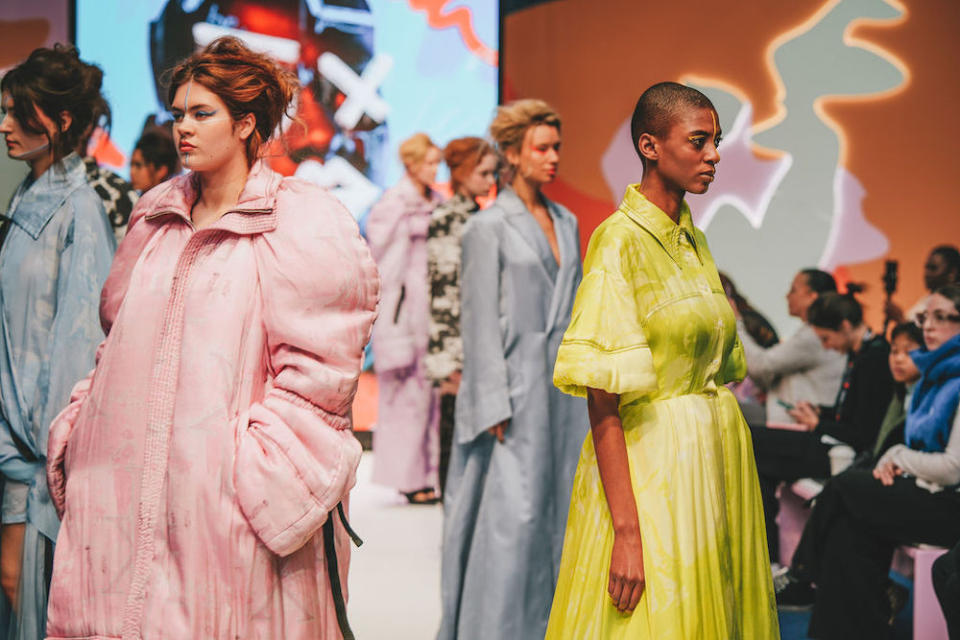Retailers Discover Responsible Suppliers from Global Destinations at Source Fashion

Trade show Source Fashion wants to create “positive change” in the apparel industry by connecting conscientious brands with suppliers who share their values.
Source Fashion was founded roughly a year ago by Hyve Group as a responsible sourcing platform. All exhibitors are vetted and must show up-to-date certification from a firm such as Sedex. The third edition—held from Feb. 18-20, 2024 at Olympia London—featured exhibitors from more than 20 countries, including emerging destinations like Ethiopia and Tanzania.
More from Sourcing Journal
“Our mission is to help retailers and wholesalers spend their budgets with companies that do good,” said Suzanne Ellingham, sourcing director at Source Fashion. “Their response has been so positive, and we’ve seen so many successes from across the world, not just enabling U.K. retailers to source responsibly, but providing a platform for so many artisans and producers around the world to reach the U.K. market. Source Fashion is growing organically at a fantastic rate with the support of our buying and sourcing community.”
Throughout the three-day event, brand-side buyers, product developers and designers from retailers like Asos, Belstaff, Boden, Canada Goose, French Connection, John Lewis, Marks & Spencer, Next, Walt Disney and Urban Outfitters, among others were in attendance. “We’ve built a platform that the largest retailers want to source from,” said Ellingham. “At every show, we’ve improved the quality of products and the breadth of countries and regions.”

To expand its geographic representation, Source Fashion has worked with the International Trade Centre, an agency that falls under the World Trade Organization and the United Nations. This edition of Source Fashion saw a greater portion of exhibitors join the show through this partnership, including vendors from Madagascar. “I’ve come to Source Fashion specifically to meet manufacturers around Africa and Madagascar,” said Tutu Ejoh, owner of childrenswear brand Tutu Pikin, which uses fabrics made by African artisans. “Being able to come here and feel and touch the fabrics and meet the people behind the companies is priceless. I’ve never been to any other trade show or fair where I’ve been able to meet these manufacturers from all over the globe.”
Among the attendees was “Dragon’s Den” television personality and fashion investor Touker Suleyman of Low Profile Holdings, which includes the brands Hawes & Curtis and Ghost. “Here at Source Fashion, you have the world under one roof, with suppliers for all brands big or small,” he said. “There is something for everyone, from suppliers that can do small SKUs to the very large.”
Catering to premium buyers, the show launched a new Source Luxury section, which featured high-end suppliers of materials like cashmere and high-quality garment manufacturers from the United Kingdom, European countries like Portugal, Italy, France and Spain, and beyond. Among these exhibitors was U.K.-based leather wholesaler Walter Reginald. “It is hugely important to have a show like Source Fashion, and we look forward to seeing more U.K. suppliers and manufactures joining us,” said Bianca and Natalie Farbey from Walter Reginald.
Source Fashion’s seminar agenda also covered sourcing locations near and far. One session gave attendees a crash course on the U.K. Developing Countries Trading Scheme that eliminates or lowers duties for imports from 65 nations. Another panel took a deep-dive into developing country Nepal. Looking closer to home, Simon Platts, CEO of Recomme, joined Rosemary Moore, founder of Maxxam Textiles, for a panel on the pluses and challenges of U.K.-based manufacturing. Among the benefits are reduced overproduction and overconsumption, improved agility and less discounting.

Waste reduction was a common session theme. Ian Bell, EMEA manager at Kornit, detailed how low minimum order quantities (MOQs) and responsive production can improve margins and shrink inventory risk. Another panel with the Salvation Army Trading Company (SATCoL) and Pretty Lavish talked about solving fashion’s landfill crisis through recycling. Swoperz co-founder Charlene Hurlock and Thrift+ founder Joe Metcalfe also covered circularity through the lens of secondhand marketplaces and their hopes that pre loved fashion could provide competition to fast fashion in consumers eyes.
Circularity and sustainability were brought to life in a recurring catwalk show headlined by designer Patrick McDowell’s “Marie Antoinette Goes to Liverpool” collection in partnership with fiber producer Tencel. Filling out the runway presentation, exhibitors created custom looks including chunky knits, sustainable swimwear, plaids and checks, graffiti and pattern mixing. In a conversation with stylist Rebekah Roy, McDowell noted, “The current model is to perpetually grow, which doesn’t fit into a sustainable model. We need to get to a place where, for all brands circularity and offering repairs and recycling are a given.”

At Source Fashion’s next edition in July, Ellingham expects the recycling trend to accelerate. “We will see even more great ways to reuse waste and efforts to build circularity into business models,” she said. “We’re also championing the movement towards slower, seasonless fashion with a greater focus and increase in well-made, high-quality products.”
According to Jack Stratten from Insider Trends, low-price retailers like Temu and Shein don’t have the winning model for the future. In a presentation, he said companies should lean into the “selling power of transparency” with strong sustainable stories. “Transparency is the new normal,” he said. “There is a link between how transparent a brand is and how much consumers trust [and value] them.”
Responsibility and all that comes with it are an investment, but companies taking steps in the right direction are seeing the results. “We have created a show full of businesses that are doing the hard work in responsible business practices, building in new sustainable practices, doing real good in their communities when it would be often easier to take a less responsible path,” said Ellingham. “You can’t underestimate the positive reinforcement that better business is worth doing.”
Click here to learn more about Source Fashion.
